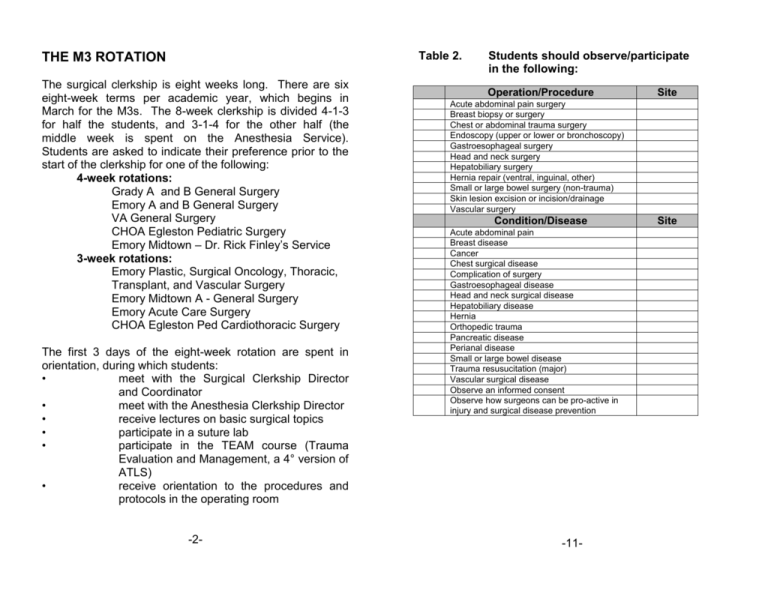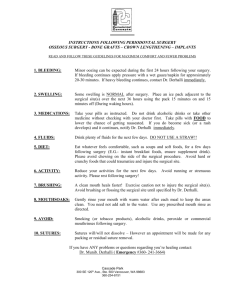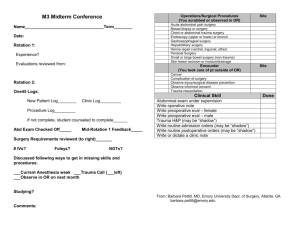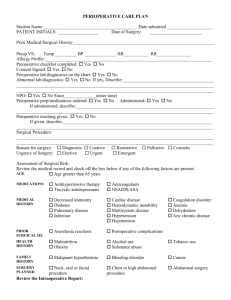The care and feeding of your M3 - The Association for Surgical
advertisement

Table 2. THE M3 ROTATION The surgical clerkship is eight weeks long. There are six eight-week terms per academic year, which begins in March for the M3s. The 8-week clerkship is divided 4-1-3 for half the students, and 3-1-4 for the other half (the middle week is spent on the Anesthesia Service). Students are asked to indicate their preference prior to the start of the clerkship for one of the following: 4-week rotations: Grady A and B General Surgery Emory A and B General Surgery VA General Surgery CHOA Egleston Pediatric Surgery Emory Midtown – Dr. Rick Finley’s Service 3-week rotations: Emory Plastic, Surgical Oncology, Thoracic, Transplant, and Vascular Surgery Emory Midtown A - General Surgery Emory Acute Care Surgery CHOA Egleston Ped Cardiothoracic Surgery The first 3 days of the eight-week rotation are spent in orientation, during which students: • meet with the Surgical Clerkship Director and Coordinator • meet with the Anesthesia Clerkship Director • receive lectures on basic surgical topics • participate in a suture lab • participate in the TEAM course (Trauma Evaluation and Management, a 4° version of ATLS) • receive orientation to the procedures and protocols in the operating room -2- Students should observe/participate in the following: Operation/Procedure Site Acute abdominal pain surgery Breast biopsy or surgery Chest or abdominal trauma surgery Endoscopy (upper or lower or bronchoscopy) Gastroesophageal surgery Head and neck surgery Hepatobiliary surgery Hernia repair (ventral, inguinal, other) Small or large bowel surgery (non-trauma) Skin lesion excision or incision/drainage Vascular surgery Condition/Disease Acute abdominal pain Breast disease Cancer Chest surgical disease Complication of surgery Gastroesophageal disease Head and neck surgical disease Hepatobiliary disease Hernia Orthopedic trauma Pancreatic disease Perianal disease Small or large bowel disease Trauma resusucitation (major) Vascular surgical disease Observe an informed consent Observe how surgeons can be pro-active in injury and surgical disease prevention -11- Site INTRODUCTION Table 4. Student log books: what they need to record 1. Required operations/procedures participated in and conditions/diseases seen 2. Skills performed 3. Clinic time/number of patients seen All must be entered by student in One45 online by end of rotation. A few factoids about the medical students: First, it’s expensive: Emory University School of Medicine will admit 132 students this year to its freshman class. Tuition and fees for the academic year 2012-13 are $45,900/year. Take off 8 or so weeks for breaks and holidays, for seven weeks on the surgery clerkship that amounts to $7,302! They are paying a lot to be with you. Second, most will not be surgeons: About 90% of Emory medical students will go into non-surgical specialties. It behooves us to make sure our future referring doctors know as much as possible about when to call us, and what to expect when they do. Third, a student’s interaction with the housestaff and attendings during their surgical rotation is a major factor in his or her decision to choose surgery as a career. We are all ambassadors of surgery, and our conduct with students will determine how many of the best and brightest among them become our future surgical colleagues. -1-12- Table 1. Skills to practice during the M3 rotation: 1. H & P – non trauma (note to housestaff: pay particular attention to abdominal, vascular, and breast exams: faculty must observe an abdominal H & P) 2. H & P – trauma 3. Scrub, gown, glove: sterile technique/universal precautions 4. Insertion of NG tube, Foley male and female 5. Chest tube insertion* and removal 6. Phlebotomy: routine and for blood cultures 7. IV insertion 8. CVL insertion* 9. Incision and drainage of abscess 10. Management of wounds: a. Dressing change b. Pack wound, wound debridement c. Remove drains (closed suction, Penrose) d. Apply wound VAC* e. Suture/staple removal and application Steristrips 11. Suturing: incisional wound closure & laceration repair 12. ETT intubation (on Anesthesia) 13. Pre-op evaluation: male and female 14. Write a clinic note, an op note 15. Write admission & postoperative orders and orders (may need to do “shadow” version) 16. Present patients on rounds: Focused (daily work rounds) Detailed (conference, teaching rounds) *Student should at least observe -10- After that, students are expected to attend the following lectures and meetings, and should be released from their clinical duties to do so: Thursday, 7-8:00 am Thursday, 8:30-10:30 am Saturday, 8-10:00 am Weekly Every other Tuesday 4-6 pm Occasional Wed Miscellaneous days Surgical Grand Rounds Lectures x 2-3 Lectures x 2 1-2 hour sessions with faculty mentor Sessions with Society Mentors Radiology lectures Second suture lab & access lab Groups of 3-5 students are assigned to a surgical faculty mentor, who meets with his or her group weekly. Because these sessions are usually set up at on a day and time convenient to the faculty, they may not be the same day and time each week. Students will let their team know when they need to leave for a mentor meeting, and they should be released to do so. At the end of the first 3 weeks of the rotation, another suture lab and a lab on advanced vascular access (CVL and IO) are scheduled so students may practice the skills they are learning in the OR. These are held on a weekday late afternoon, and students who are not post-call should be excused to come to the suture lab. The last week of the rotation is exam week: Two ½-hr oral exams with a faculty member sometime during the beginning of the week The National Board of Medical Examiners Surgery Subject Exam is given the last Friday of the rotation. This is a 100 item multiple choice exam worth 30% of their grade, and standardized to national norms Students continue their clinical duties this week, but take no night call from Sunday night on to the end of the last week, and have a reading day on the last Thursday. -3- M3 CLINICAL/WARD RESPONSIBILITIES As much as possible, M3’s should be integrated into the clinical team, keeping in mind that their purpose there is primarily education. On average, students should be assigned 2-4 in-patients to follow, although this number may vary with the experience of the students (i.e., students in the sixth term of the year may be able to follow more, while beginning M3’s may need fewer), and the acuity of the patients being assigned (i.e., a student with two very sick patients may have all she or he can handle). Students should write “SOAP” notes on all patients each day, and may write post-operative notes with supervision. All student notes and orders must be countersigned by housestaff. Students may not dictate operative reports or discharge summaries, nor may they give verbal orders. Because the students are not allowed to enter into the EMR at Emory and Grady, encourage them to write “shadow” notes and H & P’s, and go over these with them. Please observe your newly assigned medical students as they do their histories and physicals: you will be asked to evaluate their competence in doing so. Review and countersign their written work-ups, and let them know where they can improve. During their first week on your service, they are asked to fill out, usually with the chief or senior resident, a short form indicating when they will have their days off. In the middle of the month they are asked to get feedback from a faculty member or chief/senior resident and have them sign off on this. Both of these forms must be turned into the clerkship office. The students are asked to evaluate all housestaff and attendings at the end of their rotation, and those evaluations will be passed on to you by the Clerkship Director. It is a particularly fun task to be able to pass along kudos and good comments about the housestaff. Your abilities as a teacher and instructor are noticed and appreciated. REMEMBER… You are here because you love this and want to be here. The medical students are with you because they have to be, and they’re paying dearly for the experience. They will come to you with varying levels of enthusiasm for the art and science of surgery. Whatever their feelings about surgery, our job is to make sure that when our kid has appendicitis, or our mother has breast cancer, they know how to recognize it and refer to a surgeon in a timely fashion. Treat them with respect and dignity. If you have any questions relating to the students, here’s who to call: Surgery Clerkship Director: Dr. Barbara Pettitt 404-663-9437 (cell) 770-496-0130 (home) Barbara.pettitt@emory.edu Surgery Clerkship Coordinator: Jennifer Peters 404-712-7778 Jennifer.s.peters@emory.edu THANK YOU! -4-9- M3’s should not be “pre-rounding” on any patients but their own, and should not be coming in, except in special circumstances, any earlier than 0500. M3’s should not be transporting or otherwise accompanying patients unsupervised, nor should they be left on their own in highly acute units (e.g., the SICU). The balance of how much “scut” is desirable for education and enmeshing the student into the team, and how much is undesirable erosion into the time the students need to study and read about their cases, is a delicate one. One almost universal student opinion on evaluations, however, is that they don’t mind doing scut, even a lot of it, even not on their own patients, as long as the housestaff spend time with them teaching and helping them learn. Students are given a list of skills which they must practice during the rotation (see attached). Please supervise the students as they do these, and be able to give your evaluation of their procedural skills at the end of the rotation. Students must also keep a log of the cases in which they have participated. Make sure your students have some time every day to study, and have them help the entire team to learn by making short presentations on topics pertinent to the team’s patients, and looking up references for the rest of the team. Please be mindful of what your students have seen and still need to see, and assign them to the operating room accordingly (e.g., a student who has already scrubbed in on 4 breast biopsies would probably be better served scrubbing in on something else). Please try not to use the students simply to fill in “assisting holes” in the operating room. One of the biggest student beefs about the operating room is that no one talks to them! Talk! While you are scrubbing, come up with two or three key points about the anatomy or pathophysiology involved in the case you’re about to do, and make sure you bring those up during the operation. Involve the students…give them something to do. And, as much as possible, time in the OR and the clinics should not be sacrificed for ward duties (“scut”). M3 CLINIC RESPONSIBILITIES Whenever possible, M3’s should be assigned to a specific attending’s clinic (especially at Emory) and should “shadow” the attending for that period of time. As with the ward patients, all M3 notes and orders must be countersigned. Given that so many of our students will not be surgeons, the clinics represent a potentially great way for the future non-surgeon to see how surgical disease presents and to figure out when a surgeon should be involved. M3 OR RESPONSIBILITIES M3 CALL AND TIME OFF Students are given a list of general surgery and surgical subspecialty procedures they are to try to observe/scrub in on during their rotation (see attached). Remember they have only seven weeks of surgery as an M3 and may not do any surgery as an M4. Rules for hours on duty are the same as those for housestaff. Whenever possible, no more than two students should be scheduled to be on call on the same night, and in general, if students take call on your service, -5- -6- they should be shadowing an upper level resident, not spending the night on routine ward duties. All students take 4 nights of in-house trauma call at Grady. On other services, students may be asked to take call from home, and are called in for interesting cases that occur during the night. Students should be released at noon following a night on in-house call. Students DO take call on the weekend between service changes. Students have several School of Medicine holidays each year, and they are off on those days. The Surgery Education Office will let housestaff know when these days are. Other than that, students are expected to work weekends (including the weekend between service changes), with the proviso that, like the housestaff, they are given one full day off per week. initiative, integrity, judgment, dependability, reliability, and dress. Please write constructive narrative comments that address both the students’ strengths and weaknesses. If you feel a student is not performing up to par, or is otherwise in trouble, please notify the Clerkship Director immediately! It is not fair to the student to let them perform in an unsatisfactory manner the entire month, and then write a poor evaluation. The students’ grades are determined as follows: Written examination 30% Oral examinations (2) 30% (15% each) Ward evaluations (2) 30% (15% each) Case write-ups and patient logs 10% Students do not take call the last week of the rotation from Sunday evening through Friday, so that they can study for their oral and written examinations. They are released after their lectures on the Thursday before the last Friday to study for the written exam. Given the amount of weight the written examination carries, you can see why the students need to spend some time every day (when they are awake and alert!) studying. M3 ASSESSMENT MISCELLANEOUS The Surgical Clerkship Director meets with all students after the first month to discuss their performance thus far. Residents should promptly complete the online evaluations of their students after each month. The Clerkship Director may also call members of the team for their evaluations of the students. Housestaff are asked to evaluate students’ cognitive knowledge, procedural skills, and such professional qualities as rapport with patients and the team, Please keep relationships between you and your students professional: do not ask students for dates or personal favors, and do not yell at, swear at, tease, harass, humiliate or otherwise abuse your students. They are in a very vulnerable position: they know you will be writing their evaluations, and they do not want to appear uncooperative. If you feel a student has “screwed up”, a quiet talk, in private, letting them know where they need to improve, is more appropriate. -7- -8- The Care and Feeding of Your M3! The Emory Surgical House Officer's Guide to Third-Year Medical Student Education Barbara Pettitt, MD Surgery Clerkship Director June 2012








